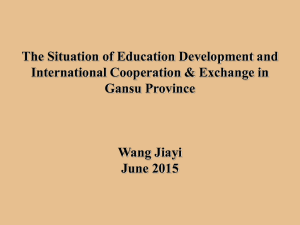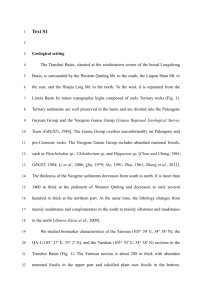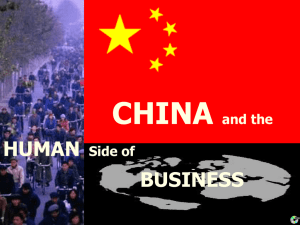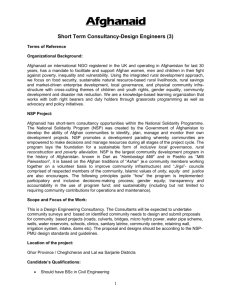Report NSP mission to Beijing/Gansu 4-10 Sep
advertisement
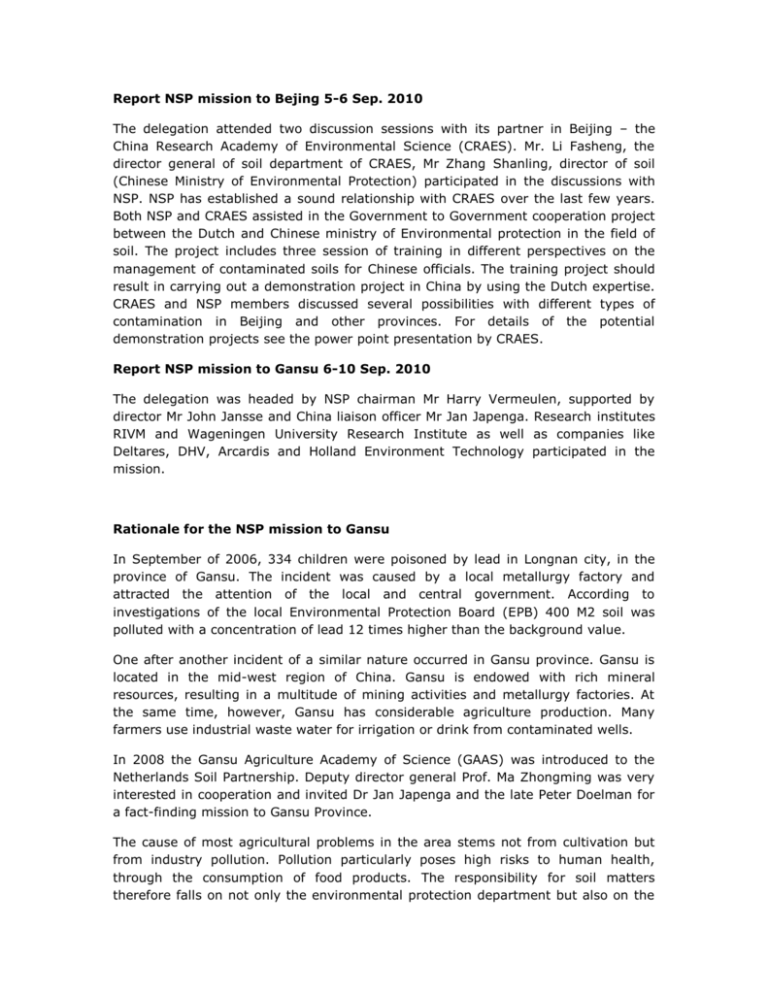
Report NSP mission to Bejing 5-6 Sep. 2010 The delegation attended two discussion sessions with its partner in Beijing – the China Research Academy of Environmental Science (CRAES). Mr. Li Fasheng, the director general of soil department of CRAES, Mr Zhang Shanling, director of soil (Chinese Ministry of Environmental Protection) participated in the discussions with NSP. NSP has established a sound relationship with CRAES over the last few years. Both NSP and CRAES assisted in the Government to Government cooperation project between the Dutch and Chinese ministry of Environmental protection in the field of soil. The project includes three session of training in different perspectives on the management of contaminated soils for Chinese officials. The training project should result in carrying out a demonstration project in China by using the Dutch expertise. CRAES and NSP members discussed several possibilities with different types of contamination in Beijing and other provinces. For details of the potential demonstration projects see the power point presentation by CRAES. Report NSP mission to Gansu 6-10 Sep. 2010 The delegation was headed by NSP chairman Mr Harry Vermeulen, supported by director Mr John Jansse and China liaison officer Mr Jan Japenga. Research institutes RIVM and Wageningen University Research Institute as well as companies like Deltares, DHV, Arcardis and Holland Environment Technology participated in the mission. Rationale for the NSP mission to Gansu In September of 2006, 334 children were poisoned by lead in Longnan city, in the province of Gansu. The incident was caused by a local metallurgy factory and attracted the attention of the local and central government. According to investigations of the local Environmental Protection Board (EPB) 400 M2 soil was polluted with a concentration of lead 12 times higher than the background value. One after another incident of a similar nature occurred in Gansu province. Gansu is located in the mid-west region of China. Gansu is endowed with rich mineral resources, resulting in a multitude of mining activities and metallurgy factories. At the same time, however, Gansu has considerable agriculture production. Many farmers use industrial waste water for irrigation or drink from contaminated wells. In 2008 the Gansu Agriculture Academy of Science (GAAS) was introduced to the Netherlands Soil Partnership. Deputy director general Prof. Ma Zhongming was very interested in cooperation and invited Dr Jan Japenga and the late Peter Doelman for a fact-finding mission to Gansu Province. The cause of most agricultural problems in the area stems not from cultivation but from industry pollution. Pollution particularly poses high risks to human health, through the consumption of food products. The responsibility for soil matters therefore falls on not only the environmental protection department but also on the agriculture department. GAAS was very interested in Netherlands in order to find a solution for local problems. cooperation with the Another factor facilitating cooperation is the “Go West” strategy of the Chinese government. The central government is making large resources (financial and otherwise) available for provinces in the middle and west region of China, among them Gansu. Gansu has recently been quite successful in attracting this policy/financial support from the central government. Long term result of the mission 1. Official establishment of the Technology Transfer Center (TTC) at Gansu Agriculture Academy of Science (GAAS) Description: Witnessed and supported by the vice Governor Mr Hao Yuan, the working agreement between NSP and GAAS for TTC was signed. It is an important symbolic moment to officially establish the TTC in Gansu province. In the future the TTC will act as a platform, offer concrete technology/knowledge demand of technology from Gansu (and surrounding region). In order to offer more opportunities for NSP partners, the TTC will gradually include several partners such as local industry, the environmental protection bureau and research center, the local city spatial planning bureau. 2. Participation in a land management project (sustainable city planning and development), with the support of the Governor. Description: Baiyin city (Chinese for “silver” city) has produced many kinds of metal products in past decades. However, the mineral resources in this region will be exhausted in the coming years. The local government is planning to promote a more sustainable economic growth for the city. Most of the contaminated agricultural lands may not be economically feasible to remediate. A feasibility study for more attractive solutions for land management is therefore called for. 3. Identify industrial remediation projects Description: Food safety is an important issue for the agriculture department. For that reason GAAS is very keen on cooperation with the Netherlands. However, in order to essentially stop pollution, industries have to take measures. Hopefully in the future, through cooperation with relevant Gansu governmental departments, NSP will be able to offer opportunities in various environmental fields. Short term results of the mission This visit resulted in the following short term results 1. Possible demonstration project at Yongdeng County: Waste water irrigation, causes productivity decreases and possible risks for human habitation via the passing of agriculture product. 2. Possible demonstration project at Baiyin City: Agriculture site contaminated by fluorine. Carry out research project and investigate the best possibilities for treatment. 3. Wageningen student study program in Gansu 4. GAAS will participate in the Wageningen University/China Soil Research Institute energy cropping project. 5. A visit to the Netherlands by Gansu governmental departments in December 2010 Annexes - Visiting program - MoU Technology Transfer Center (TTC) - Potential projects in Gansu Province - Potential projects description - Matrix cooperation content filled in by Gansu Agriculture Academy of Science - The plan for TTC – input by Gansu Agriculture Academy of Science - Time table and responsibilities for cooperation - Fact finding mission reports by Dr. Jan Japenga and the late Peter Doelman - Presentation by Prof. Li Fasheng - China Research Academy of Environmental Science

